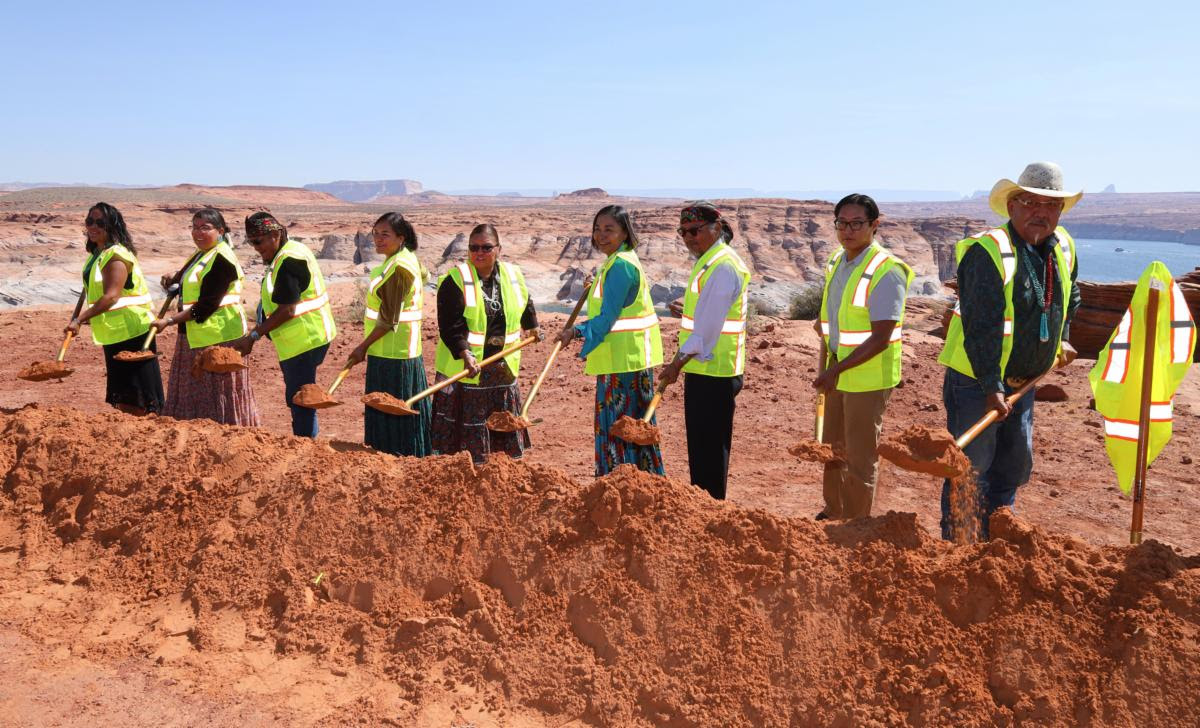
- Details
- By Native News Online Staff
On Wednesday, June 18, members of the 25th Navajo Nation Council joined the Navajo Nation Water Rights Commission, LeChee Chapter leadership, the Navajo Department of Water Resources (DWR), and other key stakeholders to celebrate the blessing ceremony and groundbreaking of Phase I of the Western Navajo Pipeline – the LeChee Water System Improvement Project.
The event marked the official start of construction and highlighted the continued collaboration between the Navajo Nation, engineering firm Brown and Caldwell, and B4 Enterprises to bring clean, dependable water to the LeChee community.
DWR Principal Hydrologist Robert Kirk delivered a historical overview of the project, which began in 1996 when the former LeChee Chapter President first proposed alternative solutions to address the chapter’s water challenges.
Significant progress came in 2016 when the 22nd Navajo Nation Council passed resolution CJA-12-16, adopting the Sihasin Fund Bulk Water & Wastewater Development Expenditure Plan. The plan allocated over $101 million for water infrastructure projects across the Nation, including the LeChee system. This funding allowed Brown and Caldwell to conduct vital water analyses and feasibility studies.
Momentum continued in 2021 with the passage of CJY-39-21, sponsored by former Council Delegate Paul Begay. This legislation secured an additional $58.2 million, fully funding Phase I of the pipeline project.
Speaker Crystalyne Curley emphasized the importance of perseverance, collaboration, and honoring the contributions of communities like LeChee, which supported the Navajo Nation for decades, notably through the Navajo Generating Station (NGS).
“This community has given back to our government and the Nation is what it is today because of the Western Agency,” Speaker Curley said. “I’m excited for this project and the opportunities it will provide for your families.”
She also credited past councils and delegates for laying the foundation for continued infrastructure development.
“If you look at the history of the Navajo Nation Council, millions of dollars have been dedicated to infrastructure improvements—powerlines, water lines, and more,” she said. “Investing in essential services for our Navajo people remains a top priority of the 25th Navajo Nation Council.”
Council Delegate Helena Nez Begay expressed gratitude to the LeChee Chapter staff and recognized the spiritual guidance that has supported the project throughout its long journey.
“Prayers have carried us to this day. My mother used to say that as a leader, you must have a prayer and a teaching to guide your community,” said Delegate Nez Begay.
Former Council Delegate Paul Begay reflected on the decades of persistence and leadership that brought the project to this point.
“It took 30 years to bring the LeChee Water System Improvement Project to Phase I,” he said. “Many leaders helped keep this project alive. I want to thank my co-sponsors—Council Delegates Otto Tso, Herman Daniels Jr., Thomas Walker, and Carl Slater. This project passed through many levels—chapter, county, state, and federal. The real work begins today.”
Council Delegate Otto Tso offered the traditional blessing for the project, while Council Delegates Brenda Jesus and Herman Daniels Jr. joined in the groundbreaking ceremony.
The 25th Navajo Nation Council extends its sincere appreciation to all former Council Delegates, and to city, county, state, and federal partners whose dedication helped make this long-awaited project a reality.
More Stories Like This
NCAI Passes Two Emergency Resolutions on Immigration Enforcement ActivitiesChickasaw Lighthorse Police Officer named Indian Country Law Enforcement Officer of the Year
Indian Gaming Association Rallies Broad Coalition Against Sports Event Contracts It Calls Illegal Threat to Tribal Sovereignty
Navajo Resources and Development Committee Issues Notice on Livestock Inspection Requirements
American Prairie, Tribal Coalition Files Protest Over Rescinded Grazing Rights
Help us defend tribal sovereignty.
At Native News Online, our mission is rooted in telling the stories that strengthen sovereignty and uplift Indigenous voices — not just at year’s end, but every single day.
Because of your generosity last year, we were able to keep our reporters on the ground in tribal communities, at national gatherings and in the halls of Congress — covering the issues that matter most to Indian Country: sovereignty, culture, education, health and economic opportunity.
That support sustained us through a tough year in 2025. Now, as we look to the year ahead, we need your help right now to ensure warrior journalism remains strong — reporting that defends tribal sovereignty, amplifies Native truth, and holds power accountable.
 The stakes couldn't be higher. Your support keeps Native voices heard, Native stories told and Native sovereignty defended.
The stakes couldn't be higher. Your support keeps Native voices heard, Native stories told and Native sovereignty defended.
Stand with Warrior Journalism today.
Levi Rickert (Potawatomi), Editor & Publisher


